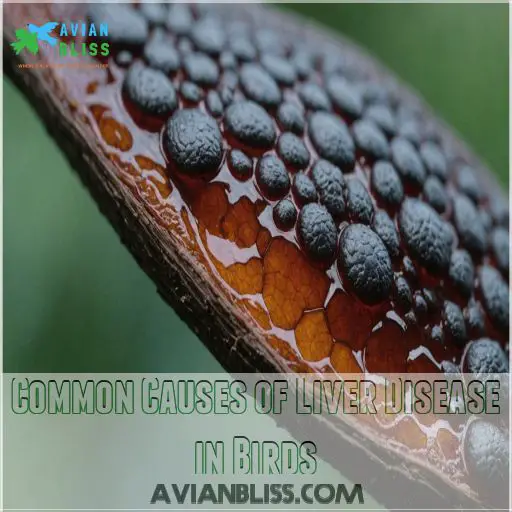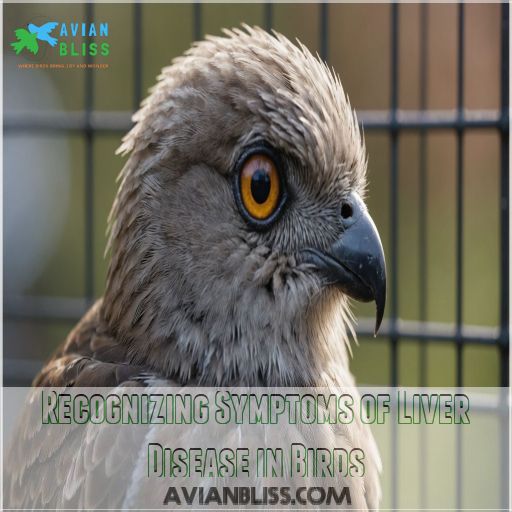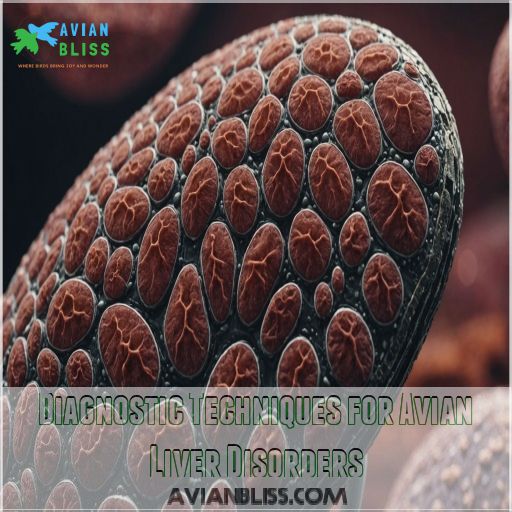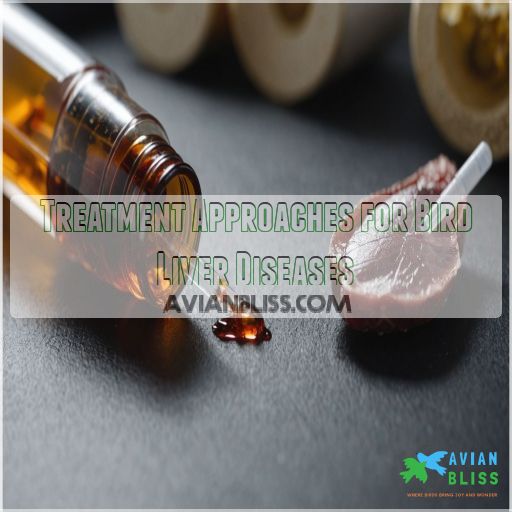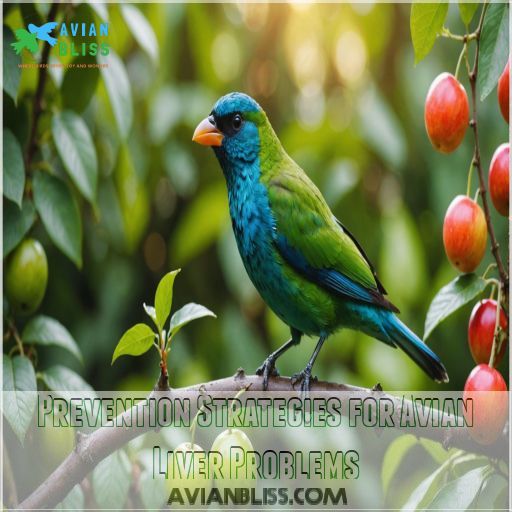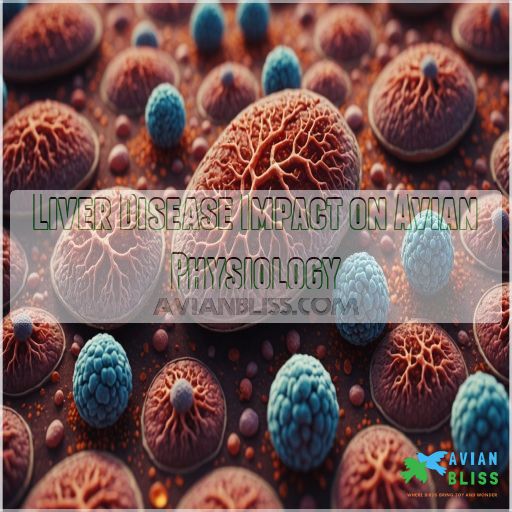This site is supported by our readers. We may earn a commission, at no cost to you, if you purchase through links.
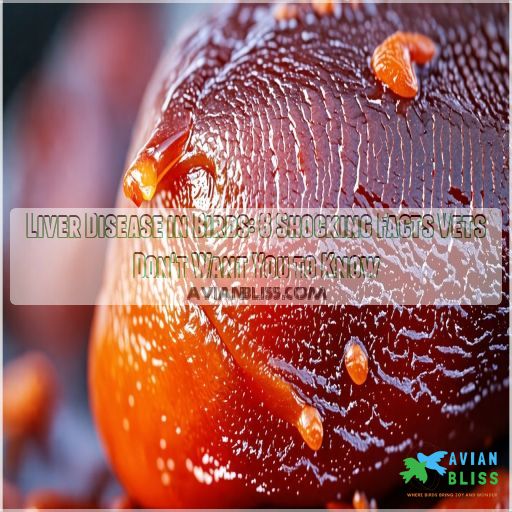
You might notice your avian pal losing weight, sporting dull plumage, or acting like a couch potato. Their droppings might take on unusual colors, and they could develop a pot belly that’s not from overindulging in millet.
Catching these signs early is key to keeping your bird’s liver in tip-top shape. With proper care and a keen eye, you can help your feathered companion avoid liver troubles and keep soaring high.
But there’s more to this story than meets the eye, and a keen eye is indeed necessary to detect the subtle signs of liver disease in birds.
Table Of Contents
- Key Takeaways
- Common Causes of Liver Disease in Birds
- Recognizing Symptoms of Liver Disease in Birds
- Diagnostic Techniques for Avian Liver Disorders
- Treatment Approaches for Bird Liver Diseases
- Prevention Strategies for Avian Liver Problems
- Liver Disease Impact on Avian Physiology
- Species-specific Considerations in Bird Liver Disease
- Emerging Research in Avian Liver Disease
- Frequently Asked Questions (FAQs)
- What is fatty liver disease in birds?
- What causes liver disease in birds?
- Do birds lose weight if they have liver disease?
- What is liver disease in the avian patient?
- Is bird liver disease curable?
- What is one of the first signs of liver disease?
- What do you feed a bird with liver disease?
- What are the four warning signs of a dying liver?
- Can liver disease in birds be hereditary?
- How does liver disease affect a birds lifespan?
- Are certain bird breeds more prone to liver issues?
- Can stress trigger liver problems in pet birds?
- Do antibiotics affect liver health in birds?
- Conclusion
Key Takeaways
- Keep a close eye on your feathered friend’s appetite, weight, and droppings – these are early signs that their liver may be in trouble. Do not wait for symptoms to worsen before seeing the vet.
- A balanced, nutritious diet is crucial for keeping your bird’s liver healthy. Ditch the seed-heavy meals and serve up a colorful spread of vegetables, fruits, and pellets instead. Your bird’s liver will thank you!
- Preventing liver disease is all about creating a safe, stress-free environment. Steer clear of household toxins, maintain top-notch hygiene, and ensure your bird gets regular check-ups. An ounce of prevention is worth a pound of cure!
- Do not be afraid to explore alternative therapies, such as herbal remedies and acupuncture. These natural approaches can work wonders in supporting your bird’s liver health, especially when combined with traditional veterinary care.
Common Causes of Liver Disease in Birds
Your bird’s liver health can be compromised by various factors, including infections, toxins, and dietary imbalances.
Understanding these common causes is essential for maintaining your feathered friend’s well-being and preventing potentially life-threatening liver diseases.
Viral Infections in Avian Hepatic Disorders
You might be ruffled to learn that viral infections can wreak havoc on your bird’s liver. Viral hepatitis is a sneaky culprit in avian hepatic disorders, often flying under the radar until it’s too late.
Here’s what you need to know:
- Avian influenza can cause liver damage in some cases
- Duck virus hepatitis is highly fatal in young ducklings
- Diagnosis often requires testing of throat washings, typically through PCR or other molecular methods, although PCR testing of throat washings can be used
- Vaccination and good hygiene are key preventive measures
Don’t let these viral villains clip your bird’s wings. Stay vigilant and consult your vet for proper diagnosis and treatment.
Bacterial Pathogens Affecting Bird Livers
Bacterial pathogens can wreak havoc on your feathered friend’s liver. While viruses aren’t the only culprits, bacteria like Mycobacterium avium and M. genovense often target avian livers .
Let’s peek at some common bacterial troublemakers:
| Bacteria | Symptoms | Treatment |
|---|---|---|
| Mycobacterium avium | Weight loss, diarrhea | Long-term antibiotics |
| E. coli | Lethargy, appetite loss | Targeted antibiotics |
| Klebsiella | Respiratory issues | Supportive care, antibiotics |
| Pseudomonas | Respiratory issues | Supportive care, antibiotics |
Regular check-ups with an avian vet can help catch these sneaky invaders before they become a full-blown liver crisis.
Parasitic Infestations and Liver Damage
While bacteria can wreak havoc, parasites are equally sneaky liver troublemakers. These tiny invaders set up shop in your feathered friend’s body, causing a ruckus that can lead to serious liver damage.
From mites to protozoa, they are a significant threat.
With proper prevention methods and timely treatment options, you can keep your bird’s liver ticking like a well-oiled machine.
Toxins and Chemicals Inducing Liver Problems
Parasites aren’t the only threat to your feathered friend’s liver.
Environmental toxins pack a punch too. Heavy metals, pesticides, and mycotoxins can wreak havoc on avian livers.
Think of your bird’s liver as a chemical processing plant – it’s working overtime to filter out these nasties.
But even this powerhouse organ has its limits. Exposure to plant toxins and toxic chemicals can overwhelm it, leading to serious health issues.
Nutritional Imbalances Impacting Liver Health
Your bird’s liver health hinges on proper nutrition. Just like a finely-tuned engine, your feathered friend’s body needs the right fuel mix.
Nutritional imbalances can wreak havoc, leading to fatty liver disease . Too much vitamin A? That’s a recipe for disaster.
Not enough biotin? You’re courting trouble. Keep your bird’s diet balanced, and you’ll keep their liver purring like a well-oiled machine.
Metabolic Disorders Affecting Avian Livers
Beyond nutritional imbalances, metabolic disorders can wreak havoc on avian livers. These sneaky culprits often fly under the radar, causing serious damage before you’ve even noticed.
Let’s ruffle some feathers and expose the truth about avian liver metabolism gone awry:
- Fatty liver disease: The fatty liver disease.
- Fatty liver disease: The fatty liver disease: The fatty liver disease is not needed only the fatty liver disease needs to be listed so,
Recognizing Symptoms of Liver Disease in Birds
Spotting liver disease in birds can be tricky, but you’ll want to keep an eye out for some telltale signs.
Watch for changes in appetite and weight loss, as these are often early indicators of a problem.
Altered feather appearance, unusual behavior, abnormal droppings, and breathing difficulties can also be signs of liver disease in birds.
Changes in Appetite and Weight Loss
As we explore the telltale signs of avian liver disease, let’s focus on appetite and weight changes. These indicators can be as clear as a canary’s song.
Keep an eye on your feathered friend’s eating habits and body condition, including how to choose the right cheese
. Sudden shifts might signal trouble brewing beneath those colorful plumes.
| Symptom | Severity | Action |
|---|---|---|
| Reduced appetite | Mild | Monitor closely |
| Weight loss | Moderate | Consult vet |
| Swollen abdomen | Severe | Urgent care |
Don’t wait for the scales to tip. Early detection can make all the difference in treatment options and prognosis.
Alterations in Feather Quality and Appearance
While your feathered friend mightn’t be able to tell you directly, their plumage speaks volumes about their liver health.
Keep an eye out for feather loss, color changes, or unusual molting patterns. Liver disease can cause poor feather quality, making them look dull, brittle, or prone to breakage.
You might also notice your bird’s feathers becoming fluffed more often, a sign they’re not feeling their best, which can be a sign of poor feather quality.
Behavioral Changes and Lethargy
Have you noticed your feathered friend acting like a couch potato lately?
Behavioral changes and lethargy are telltale signs of liver disease in birds. Your once-chirpy companion might become listless, depressed, or fluff up their feathers.
Don’t brush it off as just a bad mood. These symptoms often signal advanced liver problems, so it’s vital to schedule a veterinary check-up pronto.
Early detection through blood chemistry tests can be a real lifesaver for your avian pal.
Abnormalities in Droppings and Urates
For your feathered friend, droppings can be a window into their liver health.
Keep an eye out for changes in dropping color and urate consistency. Yellow or green urates often signal liver health issues. You might notice a shift in dropping frequency or odor too.
If something seems off, don’t wait – consult your vet. They may recommend DNA tests or even a veterinary autopsy to pinpoint the issue and suggest appropriate treatments, from antiviral medications to natural products.
Respiratory Distress and Abdominal Swelling
Your feathered friend’s health is no joke, especially regarding liver disease. If you notice your bird’s breathing becoming labored or its belly swelling up like a balloon, it’s time to pay attention.
These symptoms, known as respiratory distress and ascites, can signal serious liver problems in birds like Amazon parrots and mynah birds.
Don’t let your birdie suffer in silence – increased exercise and proper care can help keep their liver chirping along smoothly.
Neurological Signs Associated With Liver Dysfunction
The brain-liver connection in birds can be a real head-scratcher.
When liver disease strikes, it can cause a range of symptoms, including tremors, head shaking, or a "drunken sailor" walk.
These neurological symptoms stem from toxins building up in the brain due to liver dysfunction (Source).
Don’t ignore these signs; they’re your bird’s way of waving a red flag.
Diagnostic Techniques for Avian Liver Disorders
You’ll need a range of tools to spot liver troubles in your feathered friends.
From blood tests to high-tech imaging, vets use an arsenal of techniques to diagnose avian liver disorders.
Avian liver disorders and get your birds back to chirping health.
Physical Examination and Medical History Assessment
Unmasking the hidden signs of avian liver disease begins with a keen eye and a detective’s mind.
During a physical exam, your vet will gently palpate your bird’s abdomen, checking for swelling or tenderness. They’ll assess your feathered friend’s weight, feather quality, and overall demeanor.
Don’t be surprised if they ask about your bird’s dietary habits, recent changes, and potential exposure to toxins.
It’s like putting together a puzzle, with each piece revealing important clues.
Blood Tests for Liver Enzyme Levels
Feathered friends can’t hide their liver health from a simple blood test.
Veterinarians use liver enzyme tests to peek into your bird’s hepatic function. These tests measure levels of AST, GGT, and bile acids. Normal values vary by species, so interpreting results requires expertise.
Abnormal enzyme levels may indicate liver disease, but they’re just one piece of the puzzle. Your vet will consider these results alongside other clinical signs to determine the best course of action.
Imaging Techniques: Radiography and Ultrasonography
While blood tests offer insights, radiographs and ultrasounds can paint a clearer picture of your bird’s liver health.
These imaging techniques reveal:
- Liver size and shape changes
- Presence of masses or tumors
- Fluid accumulation in the abdomen
- Tissue density alterations
Radiograph interpretation can be tricky, but don’t let that ruffle your feathers. For instance, liver disease in birds can be caused by various factors, including viral and bacterial infections, which can lead to changes in liver size and shape, as seen in Liver Disease Causes. Understanding these causes can help veterinarians make more accurate diagnoses.
Ultrasounds, though limited by air-filled spaces, provide real-time views. Together, they’re powerful tools in diagnosing avian liver disease.
Laparoscopy and Liver Biopsy Procedures
You’re about to go under the microscope, quite literally! Laparoscopy and liver biopsy procedures offer a bird’s-eye view of your feathered friend’s liver health.
These minimally invasive techniques involve small incisions and specialized tools to examine and sample liver tissue.
While the risks are low, potential complications include bleeding or organ injury.
Recovery is typically quick, with most birds bouncing back within a few days.
Costs vary, but the valuable insights gained often outweigh alternatives.
Advanced Serological and DNA Testing
Advanced blood tests and DNA analysis have revolutionized avian liver disease diagnosis. You’ll be amazed at how these cutting-edge techniques can pinpoint issues with pinpoint accuracy.
Serological testing detects specific antibodies, while DNA sequencing identifies elusive pathogens. It’s like giving your vet X-ray vision into your bird’s health!
- Highly sensitive HBV DNA detection before other markers appear
- Early diagnosis allows for prompt treatment initiation
- Monitors viral load during therapy to assess effectiveness
- Identifies drug-resistant viral strains
- Helps predict long-term prognosis and guide management decisions
Necropsy Findings in Fatal Liver Conditions
Your bird’s final story is written in its liver. During necropsy, vets uncover a treasure trove of clues.
Enlarged, discolored livers with spots or lesions often point to infections or toxins. Microscopic findings reveal the true culprits – parasites, viruses, or cellular changes.
These details aren’t just gruesome; they’re essential for understanding what went wrong and protecting your flock. It’s like CSI for birds, helping vets solve mysteries and prevent future tragedies, by providing a treasure trove of clues and enabling them to understand what went wrong.
Treatment Approaches for Bird Liver Diseases
You’ve got options when it comes to treating liver disease in your feathered friend.
From supportive care and medications to dietary changes and even surgery, vets use a range of approaches designed for your bird’s specific condition.
In this case, since there is only 1 paragraph of text, there is only 1 group of concepts.
Supportive Care and Stress Reduction
After diagnosing liver disease, supportive care becomes paramount.
Create a quiet environment for your feathered friend, as stress can worsen their condition.
Enrich their cage with soft perches and low-hanging toys to encourage gentle movement.
Keep an eye out for stress signals like feather plucking or excessive vocalization.
Maintain social interaction, but be mindful of handling techniques to minimize discomfort, allowing for a calm bird which is a healing bird.
Medication Protocols for Various Liver Conditions
Medication protocols for liver conditions in birds can feel like deciphering a code. You’ll need a steady hand and a keen eye to administer the right treatment. Let’s ruffle some feathers and explore the options:
Identifying underlying causes of liver disease is essential, as they can be linked to symptoms of lethargy and loss of appetite in birds, such as parrot not eating and sleeping a lot. Recognizing these signs early on can help inform treatment decisions and improve patient outcomes.
- Antiviral therapies: Tackling viral hepatitis head-on
- Antibiotic treatment: Fighting bacterial infections with precision
- Parasitic control: Evicting unwanted liver guests
- Liver support: Boosting your feathered friend’s natural defenses
From herbal remedies to cutting-edge pharmaceuticals, there’s a world of options to help your bird’s liver soar back to health.
Dietary Modifications for Hepatic Health
Revolutionize your bird’s liver health with a hepatic diet makeover.
Ditch the fatty seed buffet and embrace liver-friendly foods like pellets, which pack a nutritional punch without the excess fat.
Mix it up with a colorful array of veggies – think broccoli, sweet potato, and even Brussels sprouts.
Remember, variety is the spice of life, so keep your feathered friend’s plate diverse and delicious with a focus on liver-friendly foods.
Fluid Therapy and Nutritional Supplementation
Beyond dietary changes, fluid therapy and nutritional supplementation play a key role in treating avian liver disease. You’ll want to keep your feathered friend hydrated and nourished.
Here’s what you need to know:
- Fluid types: Lactated Ringer’s solution is often the go-to choice for birds.
- Supplementation needs: Potassium chloride may be added if levels are low.
- Dosage adjustments: Typically, 100 ml/kg/day is recommended for maintenance, but baby birds may need 2-3 times more.
Surgical Interventions for Liver Disorders
When fluid therapy isn’t enough, surgical interventions might be your bird’s best bet. Liver surgery in birds is a complex procedure with varying success rates.
You’ll want to weigh the pros and cons carefully:
| Procedure | Recovery Rate | Potential Complications | Estimated Cost |
|---|---|---|---|
| Liver Biopsy | 85-90% | Bleeding, Infection | $500-$1000 |
| Tumor Removal | 60-70% | Organ Damage, Anesthesia Risks | $1500-$3000 |
| Partial Hepatectomy | 50-60% | Liver Failure, Sepsis | $2000-$4000 |
| Liver Transplant | 30-40% | Rejection, Lifelong Medication | $5000-$10000 |
Remember, these procedures aren’t for the faint of heart (or wallet). Your avian vet will guide you through the options, considering your feathered friend’s specific condition and prognosis.
Alternative Therapies and Their Effectiveness
While surgery might seem like the ultimate fix, alternative therapies are gaining traction in treating bird liver diseases, often caused by fatty liver problems
.
You’ve got options like herbal remedies, acupuncture, and probiotics that can work wonders.
Some vets swear by essential oils, but the jury’s still out on homeopathy.
These approaches can be a welcome change for your feathered friend, potentially improving liver function without going under the knife, and can offer a more natural approach through methods like alternative therapies.
Prevention Strategies for Avian Liver Problems
You can protect your feathered friend’s liver with some simple strategies.
From proper nutrition to regular check-ups, these preventive measures will help keep your bird’s liver healthy and functioning at its best.
Proper Nutrition and Balanced Diets
You’ve heard about treatment, but let’s talk prevention.
Your feathered friend’s liver health starts with what’s in their bowl. Ditch those seed-based diets – they’re like junk food for birds (Source).
Instead, serve up a balanced buffet of liver-friendly foods, including fruits rich in antioxidants and fiber like apples and grapes, as well as vegetables such as kale and spinach a balanced parakeet diet. Think of it as a spa day for your bird’s insides.
Don’t forget to sprinkle in some dietary supplements, but watch out for food allergies. Your bird’s liver will thank you!
Vaccination Programs for Hepatic Viruses
Through vaccination programs, you can shield your feathered friends from hepatic viruses.
Efficacy studies show that timely vaccinations greatly reduce the risk of liver disease in birds.
Develop a cost-effective schedule with your vet, considering vaccine availability and your flock’s needs.
Remember, vaccinating isn’t just about individual protection; it’s about creating a feathered fortress of herd immunity. Don’t wing it when it comes to your birds’ liver health!
Environmental Management and Hygiene Practices
Keeping your bird’s home spick and span isn’t just about appearances—it’s a cornerstone of liver health. Beyond vaccinations, proper sanitation plays a key role in preventing hepatic issues.
Let’s feather your nest with some cleanliness wisdom:
- Scrub-a-dub-dub: Clean waterers and feeders in a 200 ppm chlorine solution (1 tablespoon bleach per gallon of boiling water)
- Dust busters unite: Remove litter and sweep floors regularly to minimize airborne particles
- Propane power: Consider flame sanitizers to blast pathogens and reduce ammonia levels
Regular Health Check-ups and Screenings
Regular health check-ups are the cornerstone of preventative care for your feathered friends, especially when it comes to identifying early signs of illness
.
Schedule routine screenings with your avian vet to catch liver issues early. These visits often include blood tests to monitor liver enzyme levels.
Don’t wait for symptoms to appear; early detection can be a lifesaver. Remember, birds are masters at hiding illness.
Make vet visits a positive experience by bringing your bird’s favorite treat. Your proactive approach helps promote top bird health and peace of mind.
Avoiding Exposure to Toxins and Chemicals
A silent threat lurks in your home, endangering your feathered friend’s liver.
You can protect your bird by:
- Choosing safe bird toys free from toxic materials
- Using bird-safe household cleaners and avoiding harsh chemicals
- Eliminating pesticides from your bird’s environment
- Removing or encapsulating lead paint in older homes
Don’t let Teflon fumes become your bird’s kryptonite. Swap non-stick cookware for safer alternatives.
Remember, a toxin-free home is a happy bird’s castle.
Stress Reduction Techniques for Birds
How can you keep your feathered friend calm and collected? Start by enriching their environment with stimulating toys and puzzles.
Optimize cage design for comfort and security, placing it away from high-traffic areas.
Try music therapy; soft melodies can soothe ruffled feathers.
Encourage social interaction through gentle handling and positive reinforcement.
Establish exercise routines to burn off excess energy.
Remember, a relaxed bird is a healthy bird, so make stress reduction a daily priority.
Liver Disease Impact on Avian Physiology
Your bird’s liver plays a vital role in its overall health, affecting everything from metabolism to reproduction.
When liver disease strikes, it can disrupt multiple bodily systems, leading to a cascade of physiological changes that impact your feathered friend’s well-being.
Effects on Metabolism and Nutrient Absorption
When your bird’s liver is under the weather, it’s like their body’s factory goes haywire.
You’ll notice changes in fat metabolism and vitamin absorption. The liver’s enzyme function takes a hit, leading to potential nutrient deficiencies.
Your feathered friend might experience digestive issues, as their body struggles to process food properly. It’s a domino effect that can leave your bird feeling off-kilter and nutritionally imbalanced.
Implications for the Immune System
Liver disease in birds packs a punch to their immune system, leaving them vulnerable to a host of health issues. Your feathered friend’s compromised liver can trigger an immune response that’s like a double-edged sword.
Here’s what happens:
- Inflammation goes into overdrive
- Immune cells become less effective
- Infection risk skyrockets
This immune suppression creates treatment challenges,
Hormonal Imbalances Due to Liver Dysfunction
Your feathered friend’s liver isn’t just a toxin filter; it’s a hormone powerhouse too.
When liver disease strikes, it throws your bird’s endocrine system for a loop. You might notice your once-chatty parrot becoming moody or your hen’s egg-laying schedule going haywire.
These changes aren’t just quirks; they’re signs of hormonal chaos. The liver’s role in hormone regulation is like a conductor leading an orchestra – when it falters, the whole symphony goes off-key, causing a conductor to lose control of the entire system.
Cardiovascular Complications in Liver Disorders
Birds with liver disease often face a domino effect on their cardiovascular system. The heart works overtime to compensate for poor liver function, potentially leading to right-side heart failure .
You might notice your feathered friend’s abdomen swelling due to fluid buildup, a telltale sign of circulatory issues .
These cardiovascular complications can sneak up on you, so keep an eye out for changes in your bird’s energy levels and breathing patterns.
Neurological Manifestations of Hepatic Disease
When liver disease strikes, it’s not just your bird’s liver that feels the heat.
The brain can take a hit too, leading to some head-scratching behaviors. You might notice your feathered friend acting a bit "bird-brained" – circling, tilting its head, or even appearing blind.
These neurological symptoms aren’t just for show; they’re your bird’s way of saying, "Houston, we’ve a problem." Don’t wing it alone; seek expert help pronto.
Reproductive Consequences of Liver Problems
Liver disease can wreak havoc on your feathered friend’s reproductive system. It’s a domino effect: liver damage leads to abnormal lipid metabolism, affecting steroid production and vitellogenesis.
You’ll notice a decline in egg quality, fertility, and hatching rates. Breeding success takes a nosedive, and chick health suffers.
Heat stress exacerbates these issues, potentially causing lighter ovaries and oviducts. Protecting your bird’s liver is key to maintaining their reproductive prowess.
Species-specific Considerations in Bird Liver Disease
You’ll find that liver disease manifests differently across bird species, from parrots to poultry and raptors to waterfowl.
Understanding these species-specific nuances is essential for accurate diagnosis and effective treatment of avian hepatic disorders.
Liver Disorders in Parrots and Psittacines
Parrots and psittacines face unique liver challenges.
Your feathered friend’s liver health hinges on proper diet and early detection.
Fatty liver disease often sneaks up on seed-loving birds. Watch for subtle signs like dull feathers or changes in droppings.
Regular check-ups and blood tests can catch issues before they become serious.
Remember, a balanced diet rich in fresh fruits and veggies is your parrot’s best defense against liver troubles.
Keep your birdie’s liver happy, they’ll keep you squawking with joy!
Hepatic Issues in Poultry and Gamebirds
When you learn about poultry and gamebird health, you’ll discover unique hepatic challenges. These feathered friends face liver issues that can ruffle your feathers.
To keep your flock’s livers in top shape, their robust immune defenses, including a high body temperature that acts as a natural "fever" to inhibit pathogen growth see more about birds immune system.
Additionally, their immune system is supported by an efficient body function – a high body temperature that inhibits pathogen growth, and a diet that minimizes pathogen exposure, which in turn reduces the risk of liver disease.
Monitor their diet closely, balancing nutrients to prevent fatty liver disease and ensuring they’ve the necessary energy production to maintain a strong immune response.
Implement strict hygiene practices to prevent the spread of disease, and don’t forget to provide a balanced and nutritious diet that meets their specific needs.
Liver Problems in Raptors and Birds of Prey
Birds of prey face unique liver challenges that’ll ruffle your feathers. These majestic hunters are especially vulnerable to anticoagulant rodenticides, which can cause fatal bleeding .
But that’s not all – check out this table of raptor liver threats:
| Threat | Impact | Prevention |
|---|---|---|
| Avian tuberculosis | Chronic weight loss | Avoid contaminated areas |
| Hemoparasites | Blood cell damage | Vector control |
| West Nile Virus | Neurological issues | Mosquito management |
| Toxins | Organ failure | Careful prey selection |
| Nutritional imbalances | Metabolic disorders | Balanced diet |
You’d be wise to keep an eagle eye on your raptor’s liver health!
Waterfowl-specific Liver Diseases
While raptors face unique liver challenges, waterfowl aren’t off the hook.
Duck virus hepatitis can strike ducklings under 28 days old, causing up to 90% mortality. You’ll spot affected ducklings with spasmodic leg contractions, dying within an hour in an eerie "arched-backward" position.
Don’t duck your responsibilities – keep age groups isolated and vaccinate breeders to protect your feathered friends.
Goose liver health is no wild goose chase either!
Passerine Bird Liver Health Concerns
Passerine birds face unique liver health challenges. You’ll find that these songbirds are particularly susceptible to Haemoproteus infections, which can cause severe hepatic damage.
Unlike waterfowl, passerines may show few clinical signs before sudden death occurs. Keep an eye out for subtle changes in behavior or appetite.
Diagnostic techniques like PCR and in situ hybridization are game-changers for identifying these sneaky protozoal invaders.
Remember, regarding passerine liver health, silence isn’t always golden.
Exotic and Rare Bird Liver Disorder Management
From out of the blue, exotic and rare birds present unique liver disorder challenges. You’ll face species-specific hurdles in diagnosis and treatment.
Vets often grapple with diagnostic dilemmas due to limited research on these uncommon species. Treatment protocols must be adjusted carefully, considering the bird’s size and metabolism.
Prognosis and survival rates can be unpredictable, so you’re in for a wild ride.
Nutritional considerations are essential, as these birds may have specialized dietary needs that impact liver health, requiring careful consideration of the bird’s size and metabolism and the importance of nutritional considerations.
Emerging Research in Avian Liver Disease
You’re about to explore the cutting-edge advancements in understanding and treating liver disease in birds, a field buzzing with innovations like genetic research and stem cell therapies.
This emerging research is essential for developing effective diagnostic tools and treatments, helping avian companions live healthier, longer lives, through advancements like stem cell therapies.
Novel Diagnostic Tools and Biomarkers
With various species facing unique liver challenges, you’ll find emerging diagnostic tools fascinating.
Liver function tests and imaging advancements play key roles, but there’s more!
MicroRNA profiling, genomic sequencing, and proteomic analysis are the new kids on the block.
These cutting-edge tools promise a bird’s-eye view into liver health, ensuring feathered friends get the best care for ongoing liver problems.
Genetic Factors in Bird Liver Disorders
Genetic factors play a surprising role in your bird’s liver health.
Recent research has uncovered inherited mutations that can make certain breeds more susceptible to liver disorders.
You might want to think about genetic screening to identify potential risks early on.
Scientists are exploring gene editing techniques to address these inherited issues, potentially revolutionizing treatment options.
Understanding your feathered friend’s genetic predisposition can help you take proactive steps to keep their liver in top shape.
Stem Cell Therapies for Liver Regeneration
Stem cell therapies are turning the tide in avian liver regeneration. You’ll be amazed by how researchers are using induced pluripotent stem cells (iPSCs) to create hepatocyte-like cells. These cells, when combined with mesenchymal and endothelial cells, can form 3D "liver buds".
While ethical considerations and cost-effectiveness are still being debated, clinical trials show promise.
The future of bird liver health looks brighter, with personalized treatments on the horizon.
Microbiome Influence on Avian Liver Health
Recent discoveries have turned the bird world upside down.
Your feathered friend’s liver health might depend on tiny gut bacteria you can’t even see! These microbes play a key role in liver function and disease resistance.
By adding prebiotics and probiotics to your bird’s diet, you’re not just feeding them – you’re cultivating an army of beneficial bacteria. It’s like planting a garden in their tummy to keep their liver happy and healthy.
Nanotechnology Applications in Treatment
Have you heard about the tiny tech revolutionizing bird liver disease treatment? Nanoparticle delivery is opening new doors in avian healthcare.
These microscopic marvels can target therapy directly to affected liver cells, boosting regeneration and minimizing side effects (Source).
Imagine smart drug capsules traveling through your feathered friend’s body, delivering medicine precisely where it’s needed.
With biosensing capabilities, these nanoparticles might even detect liver issues before symptoms appear, giving you a head start on treatment.
Climate Change Impacts on Bird Liver Diseases
Climate change is shaking up the bird world, and their livers are feeling the heat. As temperatures rise, environmental toxins become more potent, putting extra stress on avian livers.
You’ll be surprised to learn that warmer climates are causing shifts in parasite populations, increasing the risk of liver diseases in various bird species. It’s a domino effect: changes in habitat and food sources due to climate change can lead to nutritional imbalances, further compromising liver health.
This situation highlights the domino effect of climate change on avian liver health.
Frequently Asked Questions (FAQs)
What is fatty liver disease in birds?
Fatty liver disease in birds occurs when fat accumulates in the liver, replacing healthy cells.
You’ll notice obesity, overgrown beaks, and black spots on nails.
It’s often caused by seed-heavy diets.
Regular check-ups can catch it early.
What causes liver disease in birds?
Your bird’s liver can suffer from various culprits.
Infections, toxins, and poor diet are common offenders.
Seed-heavy meals often lead to fatty liver disease.
Regular check-ups and a balanced diet will keep your feathered friend’s liver chirping with health.
Do birds lose weight if they have liver disease?
Sick and sluggish, birds with liver disease often shed pounds.
You’ll notice weight loss alongside other symptoms like lethargy and overgrown beak causes
.
While not always the case, obesity can paradoxically lead to this condition, affecting your feathered friend’s overall health.
What is liver disease in the avian patient?
Liver disease in avian patients involves inflammation, infection, or degeneration of the liver.
It’s a stealthy foe, often lurking undetected until 75% of the organ’s damaged.
You’ll need keen eyes to spot subtle signs like fluffed feathers or yellow droppings.
Is bird liver disease curable?
Hold onto your feathers! Bird liver disease can often be cured if caught early.
You’ll need a vet’s expertise for diagnosis.
With care, your feathered friend’s liver can regenerate up to 75% .
Don’t wing it alone!
What is one of the first signs of liver disease?
You might notice subtle changes in your body.
Fatigue, loss of appetite, and mild discomfort in the upper right abdomen are often early warning signs.
Don’t ignore these symptoms; they’re your body’s way of signaling potential liver issues, specifically early warning signs of liver issues.
What do you feed a bird with liver disease?
Imagine your bird’s liver as a delicate filter.
To nourish it, switch to a low-fat diet rich in pellets and fresh veggies.
Cut seeds to a minimum, add milk thistle for support, and consult your vet for personalized advice.
What are the four warning signs of a dying liver?
Watch for these four red flags: jaundice (yellowing of skin and eyes), unexplained bleeding, fluid retention in your abdomen, and sudden weight changes.
These warning signs indicate your liver’s struggling to perform its essential functions.
Don’t ignore warning signs!
Can liver disease in birds be hereditary?
Ever wondered if liver disease in birds can be hereditary?
Genetic factors do play a role, like certain mutations contributing to conditions such as fatty liver disease in geese, affecting lipid metabolism and liver function.
How does liver disease affect a birds lifespan?
Liver disease can greatly reduce a bird’s lifespan, causing symptoms like lethargy, anorexia, and ascites.
Early diagnosis and proper treatment are essential to managing the condition and improving the bird’s quality of life.
Are certain bird breeds more prone to liver issues?
Cockatiels, budgies, Amazon parrots, lories, and mynah birds are more prone to liver issues due to nutritional deficiencies, especially from seed-heavy diets, which can lead to iodine deficiency and other health problems
.
Aim to provide a balanced diet to help keep these birds healthy, including a mix of fresh fruits and vegetables
.
Can stress trigger liver problems in pet birds?
Stress in pet birds can exacerbate underlying liver problems by prompting viral shedding in stressed carriers, affecting susceptible birds.
Monitoring their environment helps mitigate stress, reducing the chance of triggering such health issues.
Do antibiotics affect liver health in birds?
Picture antibiotics as tiny soldiers marching through the bird’s body.
While they fight infections, they can sometimes overwork the liver, leading to stress or damage.
It’s important to monitor liver health during antibiotic treatment.
Conclusion
Much like a puzzle with hidden pieces, liver disease in birds requires careful observation and understanding.
Recognizing the signs and knowing the potential causes can help you take proactive steps in safeguarding your feathered friend’s health.
Regular check-ups, a balanced diet, and a toxin-free environment are essential in preventing liver disease in birds.
Stay informed and vigilant to keep your avian companion healthy and happy, ensuring they continue to soar without interruption.

